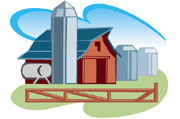Bulletin #2321, Maine Farm Safety Program: Winter Driving Safety

Bulletin #2321, Maine Farm Safety Program: Winter Driving Safety (PDF)
By Dawna L. Cyr, Farm Safety Project Assistant, and Steven B. Johnson, Ph.D., Extension Crops Specialist
For information about UMaine Extension programs and resources, visit extension.umaine.edu.
Find more of our publications and books at extension.umaine.edu/publications/.
Driving on winter roads in Maine is a challenge. There are many hazards that cannot be avoided. Learning what to do in these situations will help lessen your chances of having an accident.
Preparing for Winter Driving
Before taking any vehicle on the road in the winter, have it tuned up. Test the brakes, battery, and exhaust system. Check fluid levels, add antifreeze and switch to winter-weight oil. Put on snow tires and carry emergency equipment. Emergency equipment should include sand or kitty litter, salt, a shovel, chains, a snow scraper/brush, booster cables, blankets, and a flashlight.
- Pack a flashlight, blankets and a shovel. They may save a life.
- Keep insides and outsides of windows clear.
Skids
The primary problem faced by winter drivers is skidding on slick or icy roadways. If your car should skid, do not brake. Instead, take your foot off the accelerator and turn your car in the direction that you want the front wheels to go. Use gentle, steady motions when turning the steering wheel. Turning too much or too fast can worsen the situation. If for any reason you are unable to gain control of your car, try steering into a snow bank to stop your vehicle.
Getting Stuck
If you find yourself stuck, here are some things to try. Do not continue to spin the wheels. It will only make things worse. Pour sand, salt or gravel around the drive wheels to give them something to grab onto and improve traction. Also, shovel snow away from the wheels and out from under the car to clear a pathway.
Hazardous Driving Conditions
When driving conditions are less than ideal, it pays to be cautious. Drive slowly, test your brakes often and never tailgate. Turn on your lights, and make sure that windshields (front and rear) are clear and that wipers and defrosters are in good working condition. Use low gears when traveling on slick surfaces (especially hills) to give added traction. Listen to weather forecasts, and if weather and visibility are hazardous, stay at home.
Many hazardous driving conditions cannot be avoided, but knowing what to do may prevent an accident and save a life.
This Maine Farm Safety fact sheet is part of an educational fact sheet series produced by University of Maine Cooperative Extension. For more information on farm safety, contact your UMaine Extension County Office.
Information in this publication is provided purely for educational purposes. No responsibility is assumed for any problems associated with the use of products or services mentioned. No endorsement of products or companies is intended, nor is criticism of unnamed products or companies implied.
© 2003, 2020
Call 800.287.0274 (in Maine), or 207.581.3188, for information on publications and program offerings from University of Maine Cooperative Extension, or visit extension.umaine.edu.
In complying with the letter and spirit of applicable laws and pursuing its own goals of diversity, the University of Maine System does not discriminate on the grounds of race, color, religion, sex, sexual orientation, transgender status, gender, gender identity or expression, ethnicity, national origin, citizenship status, familial status, ancestry, age, disability physical or mental, genetic information, or veterans or military status in employment, education, and all other programs and activities. The University provides reasonable accommodations to qualified individuals with disabilities upon request. The following person has been designated to handle inquiries regarding non-discrimination policies: Director of Institutional Equity and Title IX Services, 5713 Chadbourne Hall, Room 412, University of Maine, Orono, ME 04469-5713, 207.581.1226, TTY 711 (Maine Relay System).

